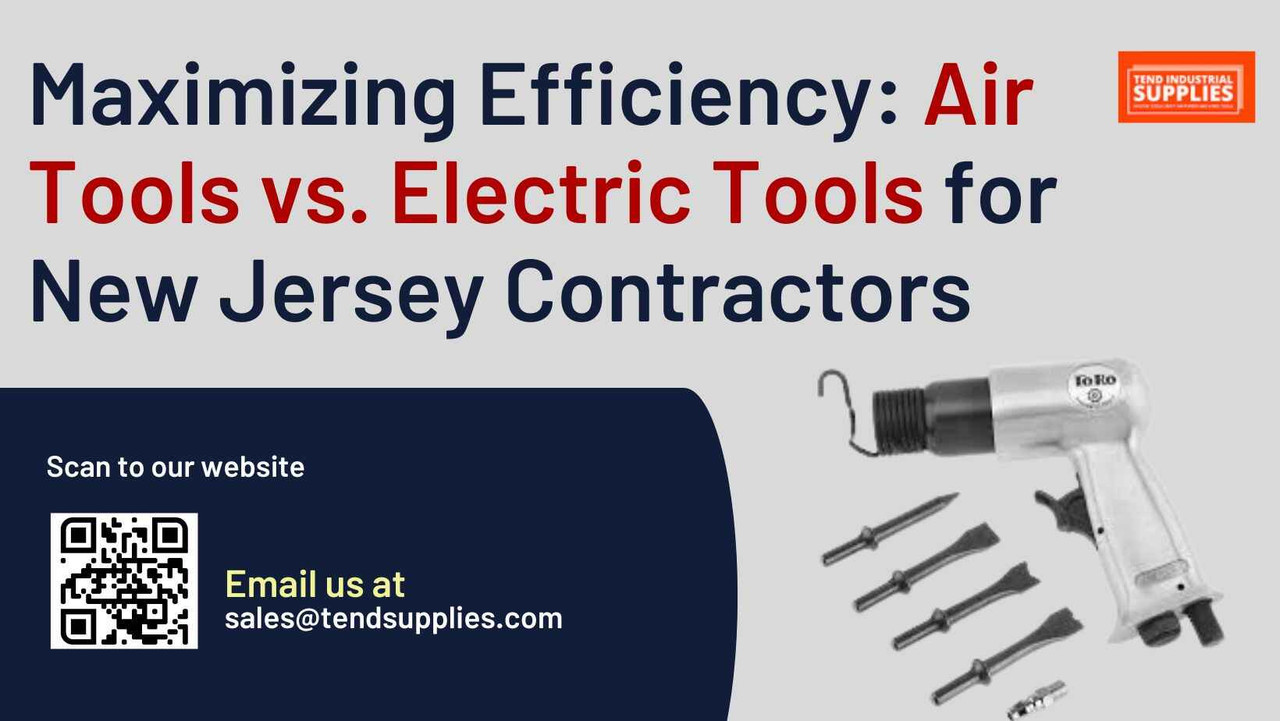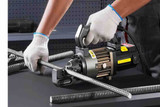Maximizing Efficiency: Air Tools vs. Electric Tools for New Jersey Contractors
Key Takeaway
For New Jersey contractors, the choice between air tools and electric tools isn't one-size-fits-all. It depends on factors such as project type, job site conditions, and specific task requirements. Air tools generally offer more power and are ideal for heavy-duty, continuous use in larger construction projects common in urban areas like Newark or Jersey City. Electric tools, on the other hand, provide greater portability and are often more suitable for smaller jobs or finish work in residential areas across the state. The key is to understand the strengths and limitations of each type and to strategically incorporate both into your toolkit to maximize efficiency across various New Jersey construction scenarios.
Introduction
In the fast-paced construction industry of New Jersey, from the high-rise developments of Jersey City to the coastal renovations in Cape May, contractors are constantly seeking ways to improve efficiency and productivity. One of the most crucial decisions in achieving this goal is choosing between air tools and electric tools. This comprehensive guide will explore the pros and cons of each option, helping New Jersey contractors make informed decisions that can significantly impact their project timelines and bottom lines.
Understanding the Basics: Air Tools vs. Electric Tools
Before diving into the specifics, let's define what we mean by air tools and electric tools:
Air Tools: Also known as pneumatic tools, these are powered by compressed air. They require an air compressor to operate.
Electric Tools: These tools are powered by electricity, either through a cord plugged into an outlet or by rechargeable batteries (cordless tools).
Comparing Air Tools and Electric Tools for New Jersey Contractors
1. Power and Performance
Air Tools:
- Generally offer more power-to-weight ratio
- Maintain consistent power output during extended use
- Ideal for heavy-duty tasks common in New Jersey's industrial construction projects
Electric Tools:
- Power can vary based on electrical supply or battery charge
- Cordless tools may experience power drop as batteries deplete
- Newer models are increasingly powerful, suitable for most residential and light commercial work in New Jersey
New Jersey Context: For large-scale projects in areas like Newark or Camden, air tools might have the edge in power. However, for residential work in suburban areas like Montclair or Princeton, modern electric tools are often sufficient.
2. Portability and Convenience
Air Tools:
- Require an air compressor, limiting mobility
- Air hoses can be cumbersome, especially in tight spaces
Electric Tools:
- Corded tools offer unlimited runtime but limited range
- Cordless tools provide maximum portability, ideal for New Jersey's diverse work environments
New Jersey Context: For work in multi-story buildings in Jersey City or on sprawling estates in Alpine, cordless electric tools offer unmatched convenience. Air tools might be preferable for stationary work in warehouse renovations in areas like Elizabeth or Secaucus.
3. Cost Considerations
Air Tools:
- Lower individual tool costs
- Higher initial investment for compressor and air system
- Long-term energy efficiency can lead to savings
Electric Tools:
- Higher upfront costs for tools
- No additional equipment needed (except battery chargers for cordless)
- Potential for higher long-term costs due to battery replacements
New Jersey Context: Consider the scale and duration of projects. For long-term, large-scale operations in industrial areas like Linden or Carteret, the initial investment in an air system could pay off. For contractors working on diverse, smaller projects across New Jersey, the flexibility of electric tools might be more cost-effective.
4. Maintenance and Durability
Air Tools:
- Generally more durable and longer-lasting
- Require regular maintenance of the air compressor system
- Less complex mechanics in the tools themselves
Electric Tools:
- Modern tools are increasingly durable
- Cordless tools require battery maintenance and eventual replacement
- More complex internal mechanisms can lead to more points of failure
New Jersey Context: In harsh environments like coastal construction in Atlantic City or industrial work in Trenton, the durability of air tools can be advantageous. For general contracting across New Jersey's suburbs, the lower maintenance needs of electric tools might be preferable.
5. Versatility and Specialization
Air Tools:
- Excellent for repetitive, high-power tasks
- Specialized tools available for specific industrial applications
Electric Tools:
- Wide range of tools available for various applications
- Cordless systems often offer interchangeable batteries across multiple tools
New Jersey Context: For specialized industrial work in places like the Port of Newark or pharmaceutical facilities in Merck, air tools often have the edge. For general contracting needs across New Jersey's diverse landscapes, from urban to suburban to rural, the versatility of electric tools is hard to beat.
6. Noise Levels
Air Tools:
- Generally noisier due to the compressor and exhaust air
- Can be an issue in noise-sensitive areas
Electric Tools:
- Typically quieter, especially cordless models
- Better suited for residential areas or noise-restricted zones
New Jersey Context: In densely populated areas like Hoboken or Jersey City, where noise ordinances are strict, electric tools have a clear advantage. For industrial or remote sites, the noise level of air tools may be less of an issue.
Best Practices for New Jersey Contractors
1. Assess Your Typical Projects:
Consider the types of jobs you most frequently undertake in New Jersey. Large-scale industrial projects might benefit more from air tools, while residential and light commercial work might be better suited to electric tools.
2. Consider Jobsite Conditions:
New Jersey's diverse landscape, from urban high-rises to coastal properties, requires different tool considerations. Evaluate power availability, space constraints, and environmental factors.
3. Invest in Quality:
Regardless of the type, investing in high-quality tools is crucial. New Jersey's construction standards are high, and your tools should meet these expectations.
4. Maintain a Mixed Arsenal:
Most successful New Jersey contractors maintain both air and electric tools, using each where they're most effective.
5. Stay Updated:
Keep abreast of technological advancements in both air and electric tools. The gap between the two is constantly narrowing.
For a more detailed comparison of pneumatic and electric tools across various job types, check out this comprehensive guide: Pneumatic vs. Electric Tools: A Comprehensive Comparison for Every Job
Emerging Trends in Tool Technology
- Brushless Motors: Improving the power and efficiency of electric tools.
- Advanced Battery Technology: Enhancing the performance of cordless tools.
- Smart Tools: Integration of digital technology for improved precision and data tracking.
- Ergonomic Designs: Reducing fatigue and improving productivity, crucial for long New Jersey workdays.
Frequently Asked Questions (FAQs)
1. How do New Jersey's weather conditions affect the choice between air and electric tools?
New Jersey's varying climate can significantly impact tool performance and longevity:
- Humidity: Air tools can be affected by moisture in the air, requiring more robust moisture separation systems, especially in coastal areas like Atlantic City or Cape May.
- Temperature Fluctuations: Extreme cold can affect battery performance in electric tools, while air tools may face issues with frozen moisture in lines during winter months in North Jersey.
- Salt Air: In coastal regions, both types of tools need protection against corrosion, but air tools might require more frequent maintenance due to their air intake.
- Rain: Electric tools, especially corded ones, require extra safety precautions in wet conditions common across New Jersey.
To mitigate these issues:
For air tools, invest in high-quality moisture separators and regularly drain compressor tanks.
For electric tools, opt for models with robust sealing and consider using battery warmers in cold conditions.
Regardless of tool type, proper storage and maintenance are crucial in New Jersey's diverse climate.
2. Are there any specific regulations in New Jersey that might affect the use of air or electric tools on construction sites?
Yes, New Jersey has several regulations that can impact tool choice:
- Noise Ordinances: Many New Jersey municipalities have strict noise regulations. Electric tools are often preferred in residential areas due to their lower noise levels.
- OSHA Compliance: New Jersey follows federal OSHA standards, which have specific requirements for both air and electric tools. For instance, there are guidelines on compressed air pressure for cleaning purposes.
- Environmental Regulations: In certain areas, especially near water bodies or in protected zones, there may be restrictions on emissions and fuel storage that could affect the use of gas-powered compressors for air tools.
- Electrical Codes: New Jersey adopts the National Electrical Code, which has implications for the use and setup of electric tools, especially in temporary construction sites.
Always check local regulations in the specific New Jersey municipality where you're working, as they can vary significantly from one area to another.
3. How do the long-term costs compare between air and electric tools for a typical New Jersey contracting business?
Long-term cost comparison depends on several factors:
Air Tools:
Higher initial investment in compressor and air system
Lower individual tool costs
Ongoing costs for compressor maintenance and electricity
Potential energy savings in large-scale, continuous operations
Conclusion
The choice between air tools and electric tools for New Jersey contractors isn't about picking a winner, but about understanding when and where each type excels. By strategically incorporating both into your arsenal, you can maximize efficiency, adapt to diverse job sites across the state, and maintain a competitive edge in New Jersey's dynamic construction industry.
Remember, the best tool is the one that gets the job done efficiently, safely, and cost-effectively in your specific working conditions. Whether you're working on a high-rise in Jersey City, renovating a historic home in Princeton, or tackling a commercial project in Cherry Hill, having the right mix of air and electric tools will ensure you're prepared for any challenge New Jersey's construction landscape throws your way.
For more insights on selecting the right tools for specific jobs, especially in the automotive industry, check out our expert recommendations on what air tools a mechanic needs in 2024.
Invest in the right tools today and experience the difference in your project outcomes and bottom line. Trust Tend Industrial Supplies to be your partner in powering New Jersey's construction success!
Related Articles
- The Ultimate Guide to Air Compressors for New Jersey Contractors
- Top 10 Electric Tools Every New Jersey Homeowner Should Own
- Maintaining Your Tools in New Jersey's Diverse Climate: A Comprehensive Guide.









